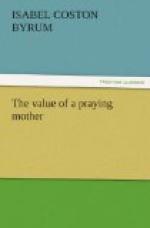Mrs. Worthington sighed deeply as she continued, “The memory of my dear father is sacred, Bessie. Many times I’ve thanked the Lord that my father knew the worth of prayer and the value of the confidence of his children. He helped me to tide over the most critical period of my life, and I love to recall the encouragement of his devoted life.”
CHAPTER VI.
CONSCIENCE.
One day when Bessie was about eight years old, she said: “Mama, you’ve often told me that if I’d listen to the voice of conscience it would keep me out of danger. What is conscience? I don’t understand.”
“My dear child,” answered her mother, “your happiness depends upon a pure conscience, one that is void of offense. By the Lord’s help, I will gladly explain. Conscience is that which causes us to feel bad when we do what we’ve been taught to be wrong. At first it is very tender and active. Then, no matter how enticing the temptation, the conscience will warn one not to yield. You’ve heard your conscience speaking to you, haven’t you, Bessie?”
“Yes, Mama,” answered Bessie; “that was why I wanted to know more about it. I thought at first it was some person speaking; but when I remembered you had told me that we each have a conscience to tell us to do right, I knew it must be the voice of conscience.”
“When it speaks, you must listen,” said Mrs. Worthington. “Give heed to its warnings. This little story will show you how careful we should be to heed the warning voice of conscience.
“’Wishing to arise at an early hour each morning, a gentleman purchased an alarm-clock. He took it home, and, having set it, went to bed and slept soundly. In the morning, to the gentleman’s great delight, the clock aroused him, so that he was able to get to work in time.
“’For a time he would spring out of bed as soon as the alarm sounded, and the clock never failed to wake him. One morning, however, on hearing the clock sound its usual alarm, he awoke, but, feeling a little sleepy, he lay back on his pillow, thinking that he would get up in a short time. In a few minutes he fell asleep, and did not awake again until very late. He dressed hastily, and, missing his breakfast, hurried away to his work. He resolved not to be so foolish again, and for a time did better; but in a few days he had again overslept. He became more and more neglectful, failing time after time to heed the alarm. At length it only partially aroused him, and he soon slumbered again. Day by day it disturbed him less, until at last it did not arouse him at all, although it sounded as loudly as ever.’




